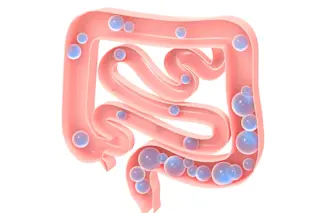Calorie-restriction — consuming 30-percent fewer calories than normal — is the only scientifically proven way to slow the process of aging in organisms ranging from yeast to mammals. Now a new study in mice shows that through a similar mechanism, calorie restriction may also slow or prevent Alzheimer's disease.
"A decrease in amount of calorie intake might have a causal effect in prevention of Alzheimer's disease," says Giulio Pasinetti, professor of psychiatry and neuroscience at Mount Sinai School of Medicine. He and his team conducted the study in a strain of transgenic mice destined to develop Alzheimer's-like symptoms. The mice that were fed a calorie-restricted diet, mainly by a reduction in their carbohydrate intake, over a period of six months, had fewer disease symptoms than their normal-diet counterparts.
"With this kind of calorie restriction we were able to improve memory function – I would say five-fold times more efficient," says ...














